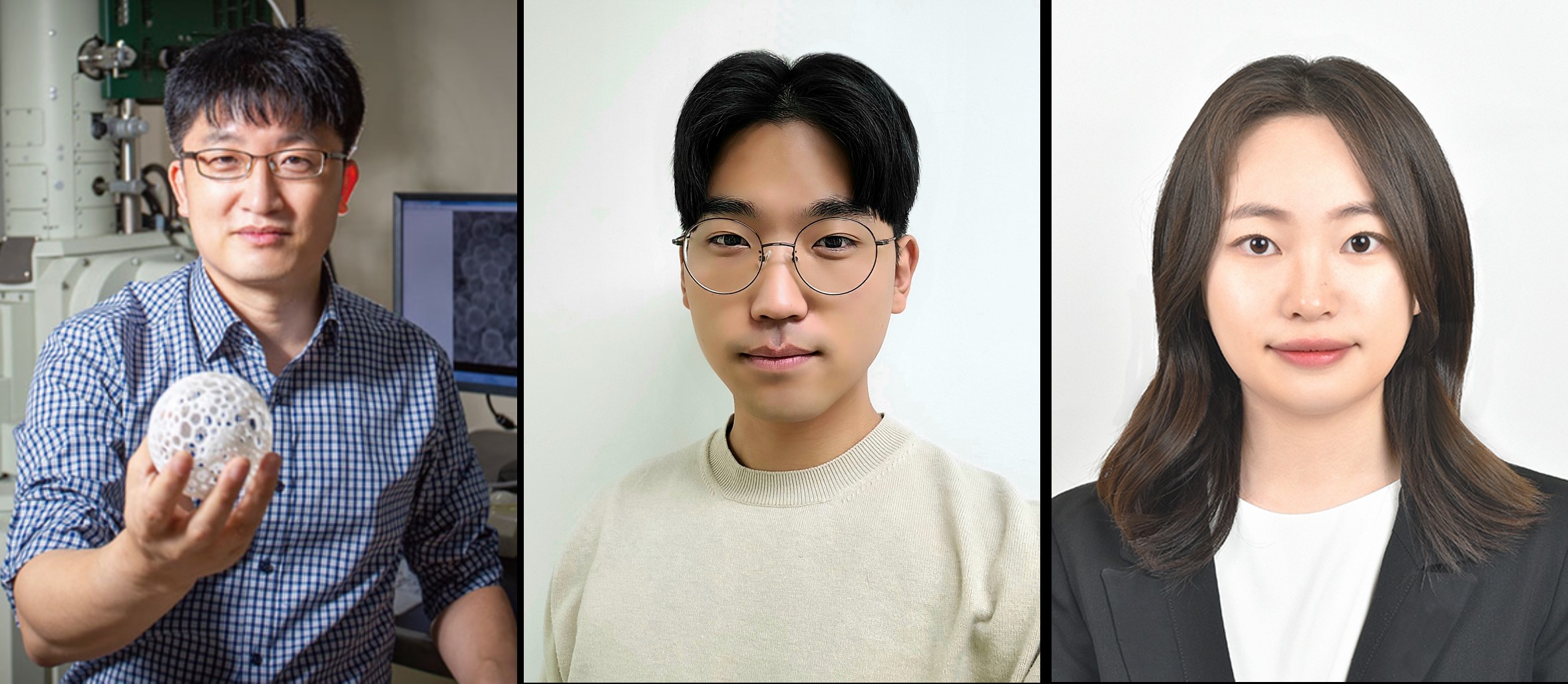Prof. Seung Uk Son’s Research Team (Department of Chemistry)
Developed Frictional Electricity Harvesting Core-Shell Structure Synergy Material

▲ (from the left) Prof. Seung Uk Son, Dr. Changwan Kang, Jina Park (Master’s degree student)
The 'Nanoporous Molecular Network' is known to be ‘multifunctional’ for its high heat stability and contact surface area, making it suitable for applications in an absorbent, sensor, catalyst, battery, and drug delivery. Chemistry Prof. Seung Uk Son’s research team has developed that frictional electricity harvesting core-shell structured materials are synthesized by applying a microporous polymer network to the shell of the material with a coupling reaction of ZnO nanorod aggregate core material. The resulting core-shell structure has a core of 440 nm diameter, composed of ZnO nanoparticles, and a microporous polymer network shell with 45 nm thickness. The ZnO nanorod in the core has 10~15nm thickness and 50~70 nm length.
Frictional electricity occurs when two materials with different electron conditions experience friction, allowing electron transfer on the surface. Recently, various research on materials or devices are being conducted to harvest this frictional electricity to utilize it as a new source of energy. Prof. Son’s research team applied ZnO, known to have polar arrangement due to piezoelectric effect, on a frictional electricity harvesting device to investigate how internal piezoelectric material affects the device during contact. In this study, the researchers observed frictional electricity harvesting capacity of the core cell material was significantly increased through comparative studies between piezoelectric materials and frictional electricity harvesting materials. In addition, the friction electricity harvesting ability was much higher when compared to the case where the piezoelectric material and the friction electricity harvesting material were simply mixed. It is believed that the polarity generated in the core cell material at the contact moment helps to transmit electrons for generating friction electricity. In other words, it can be interpreted that the polar environment due to electron transfer helps the phenomenon along with the synergy efficiency of the core cell structure.
Prof. Son also synthesized various functional materials based on nano-porous polymer networks and applied those to various fields such as battery materials, carbon-neutral eco-friendly metal catalysts, photocatalysts, sensors, and drug delivery materials. Related studies were published in the top 10% journals and were selected as cover papers.
The first author, Dr. Changwan Kang, received support from the Department of Chemistry BK21 Four project group, SKKU Post-Doc training program, and is currently continuing his research at McGill University as Post-Doc researcher. The co-author, Master’s degree student Jina Park, is supported by the Department of Chemistry BK21 Four project group. This research was conducted in cooperation with Prof. Sang Woo Kim, and Advanced Materials student Dong Min Lee.
Prof. Son’s research results have been supported by the Mid-Sized Research Support Project of the Korea Research Foundation and were published in the highest rank journal in the Chemistry field, Angewandte Chemie Int. Ed. (IF=16.823), in 2022.
※ Paper Title: Core-Shell ZnO@Microporous Organic Polymer Nanospheres as Enhanced Piezo-Triboelectric Energy Harvesting Materials

